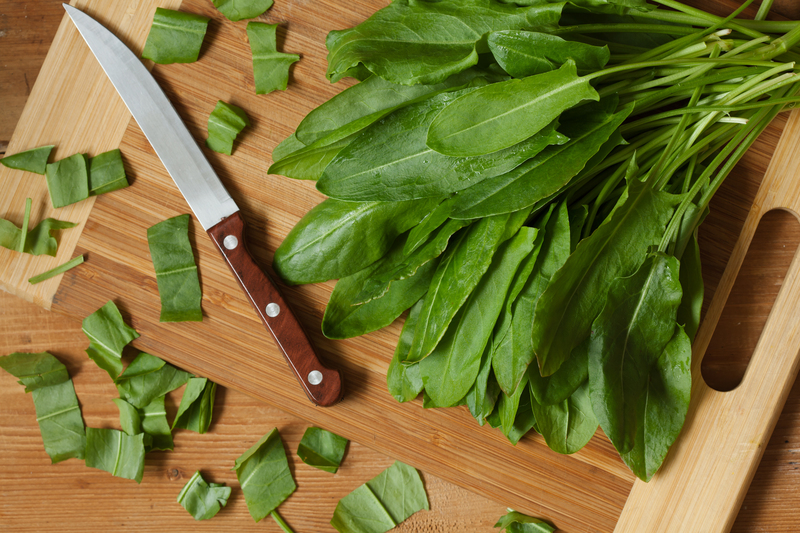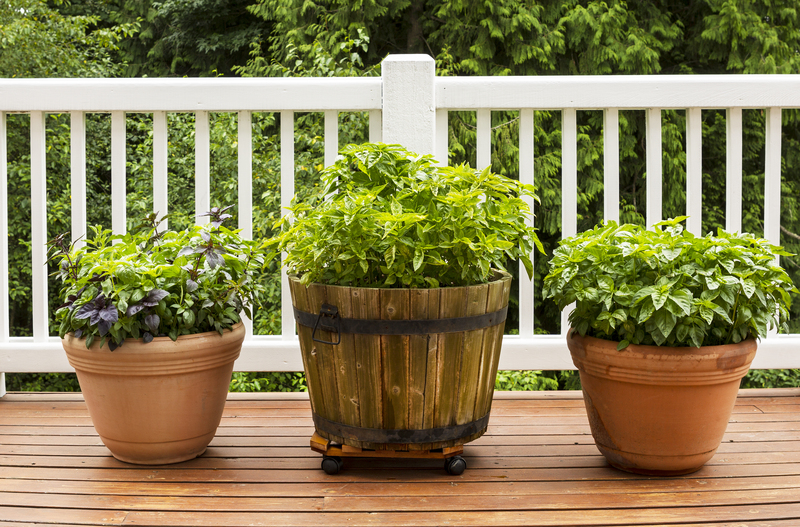Transforming Organic Waste into Fertile Soil
Posted on 07/09/2025
Transforming Organic Waste into Fertile Soil: The Ultimate Guide
Are you looking for sustainable solutions to manage household or agricultural waste? With growing concerns around environmental health, soil depletion, and landfill overflow, more people are seeking practical ways to turn organic waste into fertile soil. This comprehensive guide explores the value, methods, and benefits of transforming organic waste into rich, productive soil for gardens, agriculture, and environmental restoration.
Why Is Transforming Organic Waste Important?
Organic waste--such as food scraps, leaves, yard trimmings, and manure--makes up a significant portion of garbage sent to landfills every year. When left unmanaged, this waste produces methane, a potent greenhouse gas, and misses the opportunity to enrich the earth. By converting organic waste into fertile soil, communities and individuals can:
- Reduce landfill burden: Diverting organic material keeps landfills from filling up prematurely.
- Cut greenhouse gas emissions: Proper composting and soil enrichment decrease methane release.
- Enhance soil health: Nutrient-rich, organic matter improves soil structure and fertility.
- Encourage sustainable agriculture: Organic amendments supply crops with vital nutrients naturally.
- Promote circular economy: Waste materials become valuable inputs for new growth cycles.
Organic Waste Types Suitable for Soil Transformation
- Kitchen scraps: fruit & vegetable peels, coffee grounds, eggshells
- Yard waste: leaves, grass clippings, small branches
- Animal manure (herbivore only): horse, cow, sheep, goat
- Paper products: napkins, cardboard (uncoated, non-glossy)
Note: Avoid composting dairy, meat, fats, pet waste, diseased plants, and glossy paper, as these can bring odor, pests, or disease.

How Does Organic Waste Become Fertile Soil?
The Science Behind the Transformation
Transforming organic waste into healthy soil is primarily achieved through composting--an age-old technique accelerated by modern science. Microorganisms like bacteria, fungi, and actinomycetes break down organic matter into humus, a rich, dark substance teeming with nutrients.
This process involves:
- Decomposition: Organic molecules are broken into simpler compounds.
- Mineralization: Nutrients such as nitrogen, phosphorus, and potassium are released in forms plants can use.
- Humification: The final product, humus, improves soil structure and water-holding capacity.
Benefits of Fertile Soil Derived from Organic Waste
- Improved Nutrient Profile: Organically amended soils feature higher levels of essential plant nutrients.
- Increased Microbial Activity: Healthy soil is alive with beneficial microbes that foster plant health.
- Enhanced Moisture Retention: Soil rich in organic matter holds water more effectively, reducing irrigation needs.
- Better Crumb Structure: Looser, aerated soil encourages root growth and resists erosion.
Methods to Transform Organic Waste into Fertile Soil
1. Backyard Composting: Small Scale, Big Impact
Composting at home is the most accessible way to recycle food scraps and yard waste. Here's how to get started:
- Choose a compost bin: Use a simple pile, enclosure, or rotating drum for convenience and pest control.
- Add ingredients: Alternate 'greens' (nitrogen-rich like veggie peels) and 'browns' (carbon-rich like dried leaves or shredded paper).
- Maintain moisture: Keep compost as damp as a wrung-out sponge. Water sparingly if necessary.
- Turn regularly: Aerate the pile to provide oxygen for faster decomposition and odor control.
- Wait & harvest: In a few months, dark crumbly compost can be added to garden beds for instant soil fertility.
2. Vermicomposting: Worm Power for Richer Soil
Red wiggler worms (Eisenia fetida) are biological alchemists, rapidly breaking down kitchen scraps into superior compost known as worm castings. To start:
- Set up a vermicompost bin with drainage and bedding (coconut coir or newspaper shreds).
- Add food scraps in small quantities, avoiding citrus, onions, and meats.
- Harvest worm castings (black, earthy material) every few months to top-dress garden soil or dissolve for liquid fertilizer.
3. Bokashi Fermentation: Pre-Treating Waste for Soil Transformations
Bokashi involves fermenting organic waste in airtight containers using inoculated bran or sawdust (laced with beneficial microbes). The process is anaerobic (no oxygen) and creates pre-digested waste that can be quickly buried in soil to enrich it. Highlights include:
- Speed: Bokashi breaks down waste much faster than traditional compost as initial step.
- Less Odor: Sealed containers prevent smells and pests.
- More Waste Types Accepted: Dairy and meat can be processed (if handled with care and buried after fermentation).
4. Community Composting & Large-Scale Programs
Neighborhoods, schools, or municipalities often collaborate to process organic waste collectively. Local collection and industrial-scale composting allow for the diversion of tons of waste from landfills and create large volumes of high-quality soil amendments for community gardens, parks, and farms.
- Contact your local recycling centers or composting initiatives to participate.
- Large-scale composting facilities can handle higher volumes and temperatures, destroying weed seeds and pathogens.
Essential Steps for Successful Soil Enrichment
Follow these key strategies to ensure organic waste is effectively turned into fertile soil:
- Balance carbon and nitrogen: Keep a 2:1 ratio of carbon-rich (browns) to nitrogen-rich (greens) materials.
- Aerate the pile: Regular turning provides oxygen, helping microbes thrive and reducing foul odors.
- Monitor temperature: Compost should heat up (120-160?F). This signals active decomposition and kills pathogens.
- Maintain the right moisture: Too dry slows decomposition; too wet causes odor and anaerobic conditions.
- Allow for maturation: Finished compost resembles dark soil with an earthy scent--no visible scraps.
Special Considerations for Fertile Soil Creation
- Speeding the process: Chop materials into smaller pieces to increase the surface area for microbes.
- Compost activators: Add a handful of finished compost, healthy garden soil, or commercial activators to jump-start microbial activity.
- Winter composting: Decomposition slows in cold, but insulating piles or using insulated tumblers can help.
- Testing finished compost: Squeeze a handful--if it's crumbly and smells sweet, it's ready for use!
Applications of Soil Created from Organic Waste
The nutrient-rich soil generated from composting and other transformation methods can revolutionize how you grow food and steward the environment. Some impactful uses include:
- Garden beds and landscapes: Mix into flower and vegetable gardens for better yields, richer color, and fewer diseases.
- Potting mixes: Blend with sand, perlite, or coco coir for fertile container soil.
- Tree and shrub planting: Backfill planting holes for more robust root development.
- Lawn topdressing: Spread a thin layer over grass to boost turf health and soil life.
- Soil remediation: Restore barren, eroded, or contaminated sites by introducing organic matter and boosting microbial life.
Case Study: Urban Farm Soil Transformation
Many urban initiatives have found success by organizing community composting to enhance vacant city lots. For instance, New York City community gardens have turned thousands of tons of kitchen scraps and leaves into productive agricultural soil for neighborhood farms, supporting local food, pollinators, and biodiversity.
Common Problems When Transforming Organic Waste & How to Avoid Them
While the benefits are enormous, transforming organic waste into fertile soil can present challenges:
- Odors: Smelly compost usually results from too much nitrogen (greens) or lack of oxygen. Add more browns and turn the pile regularly.
- Pests: Bury kitchen scraps or use enclosed bins to deter rodents and insects.
- Slow decomposition: Chop materials finer, add activators, or ensure correct moisture and temperature.
- Weed seeds: Ensure compost reaches high enough temperatures to kill seeds and pathogens.

Frequently Asked Questions: Turning Organic Waste into Fertile Soil
How long does it take to turn organic waste into fertile soil?
Depending on method, climate, and materials, compost can mature in as little as 2-3 months (with regular turning and optimal conditions) or take up to a year in slower, cooler compost heaps.
Can I compost pet waste?
It's best to avoid composting waste from cats and dogs in edible gardens due to potential pathogens. Pet waste should only be composted by specialized systems, and never used for food plants.
What can't I compost?
Avoid meats, fats, dairy, diseased plants, treated wood, and glossy or coated papers to prevent bad smells, pests, and contamination.
What's the best way to use finished compost?
Mix finished compost into soil, apply as mulch around plants, or blend into potting mixes to improve water retention and nourish your plants naturally.
Conclusion: The Future of Fertile Soil Starts at Home
Transforming organic waste into fertile soil is a powerful, practical action anyone can take--whether as a gardener, farmer, business owner, or eco-minded citizen. By embracing methods such as home composting, vermicomposting, bokashi, and community programs, we can:
- Heal the earth: Restore soil health and biodiversity.
- Reduce waste: Keep organic material out of landfills.
- Grow more food: Increase productivity sustainably.
- Protect the climate: Prevent greenhouse gas emissions.
Small actions, like composting kitchen scraps, can ripple outwards--turning today's waste into tomorrow's vibrant, living soil. Let's make fertile, thriving soils the foundation of a sustainable world for generations to come.
Ready to transform your organic waste into fertile soil? Start today and join the global movement for healthier food, greener spaces, and a cleaner planet!

